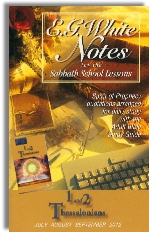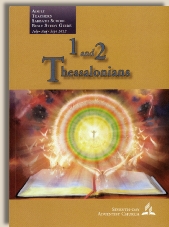|
||||||||||||||
Commentary on "Church Life (1 Thess. 5:1228)"
Day 6: Thursday, September 6, 2012 - End-Time Holiness (1 Thess. 5:2328)
The misplaced emphasis on character and behavior that has been present throughout this quarter is found once again in this lesson. Before we look at what the author writes, consider the difference between wholly and holy.
Again, let's return to the passage itself:
23 Now may the God of peace himself sanctify you completely, and may your whole spirit and soul and body be kept blameless at the coming of our Lord Jesus Christ. 24 He who calls you is faithful; he will surely do it.
Since we are studying Thessolonians, let's stay right here and read what it says here rather than jump into deep philosophical discussions about what happens in sanctification.
Who does the sanctifying? "the God of peace himself".
How much of the sanctifying does He accomplish? "completely" Notice this isn't He starts us on the path for us to complete. He does it, and He does it completely (or wholly).
Why would a lesson focus on the "ways can you, and should you, be preparing every day for the Lord’s return" when the passage says that God is going to take care of it completely? Could it be that the author of this lesson is teaching something different than the Author of I Thessolonians is teaching?
What does it mean to be sanctified? Does it mean to be made holy and perfect? Or can it mean to be set apart for God?
How about the idea of being blameless; is that something that we achieve by living perfectly?
Noah is pronounced blameless, or righteous depending on the translation, before the flood. After the flood, his actions are not blameless (Gen 9:21). In Gen 17:1 Abraham is counted among the blameless and his name change occurs. Yet in Chapter 20 he again misleads a king about the relationship between he and Sarah. While it can be argued that he wasn't technically lying; nonetheless, his actions in this regard directly led another person into sin. That is hardly the action of a perfect person. OT Scripture demonstrates that "blameless" people still committed sinful acts. The most reasonable conclusion is that the status of being blameless is an imputed pronouncement ("reckoned") rather than a behavioral statement (Heb 11:6-19; Rom 4:1-11).
Paul considered himself to be the foremost among sinners (I Tim 1:15). He used the present tense indicating that he thought that was still his deserved status. One could hardly content that Paul’s actions were more sin-filled than those around him. The most reasonable conclusion seems to be that Paul says this because of his keen recognition of the gap between his own life and the perfectness of Christ. Paul didn’t make this statement because of his humility. Instead, he points to the need we have in recognizing our own imperfection so that we can appreciate the unwarranted grace that continues to be given to us.
Paul is clear that perfection is something that occurs in our future. He says that we are sown in dishonor and weakness (I Cor 15:43). This is clearly referring to the fact that until the total change that occurs with glorification, we are not perfect beings and that we all must be changed at that time in order to spend eternity with God.
Scripture clearly teaches us that the righteousness of our behaviors continually falls short of the perfect righteousness of Christ and is therefore not sufficient to save us. We must continue to rely solely on God’s grace in order to justify us for salvation. We are blameless because, and only because, we are in Christ and are therefore clothed in Christ's robe of righteousness, counted righteous despite our imperfection.
Copyright 2012 BibleStudiesForAdventists.com. All rights reserved. Revised September 3, 2012. This website is published by Life Assurance Ministries, Camp Verde, Arizona, USA, the publisher of Proclamation! Magazine. Contact email: BibleStudiesForAdventists@gmail.com.
The Sabbath School Bible Study Guide and the corresponding E.G. White Notes are published by Pacific Press Publishing Association, which is owned and operated by the Seventh-day Adventist church. The current quarter's editions are pictured above.
Official Adventist Resources
Standard Edition Study Guide Week 10
Teacher's Edition Study Guide Week 10
Easy Reading Edition Study Guide Wk 10
Search the Complete Published Ellen G. White Writings
Please Support This Project


